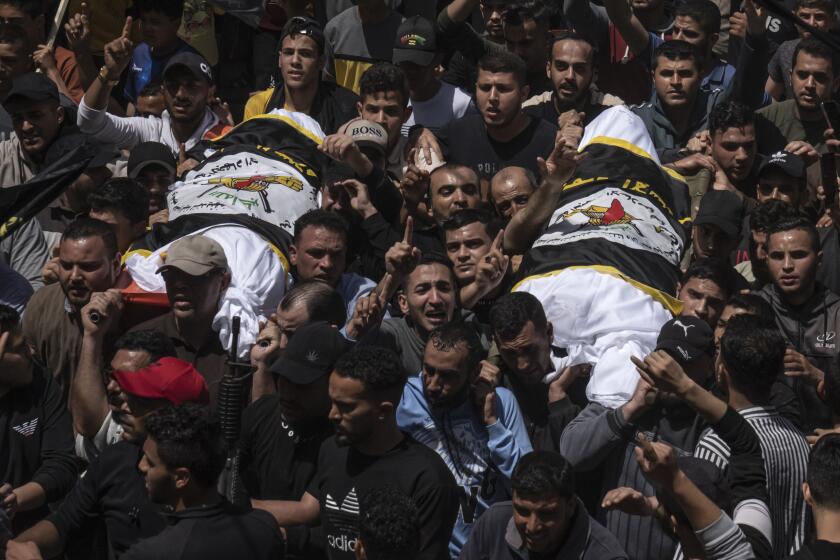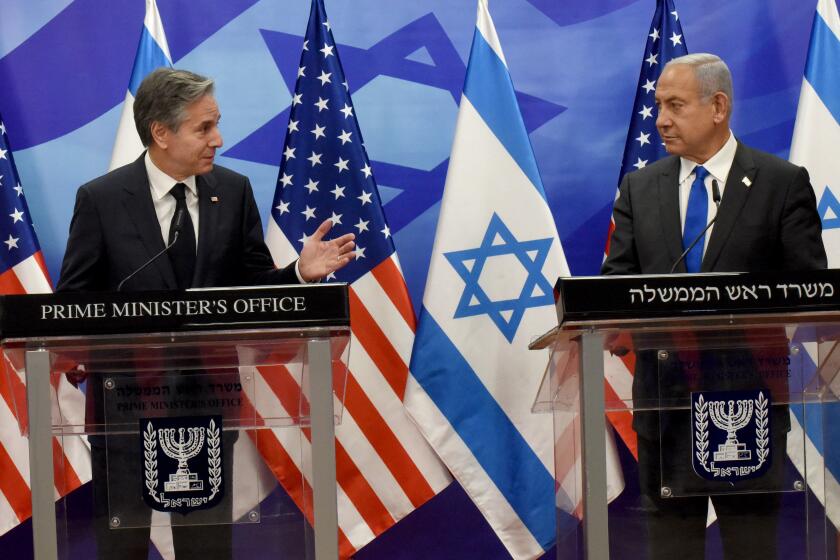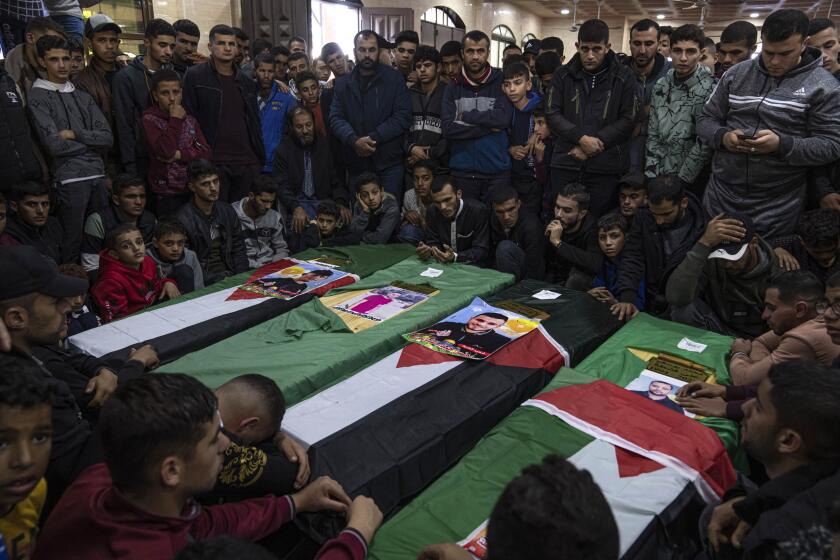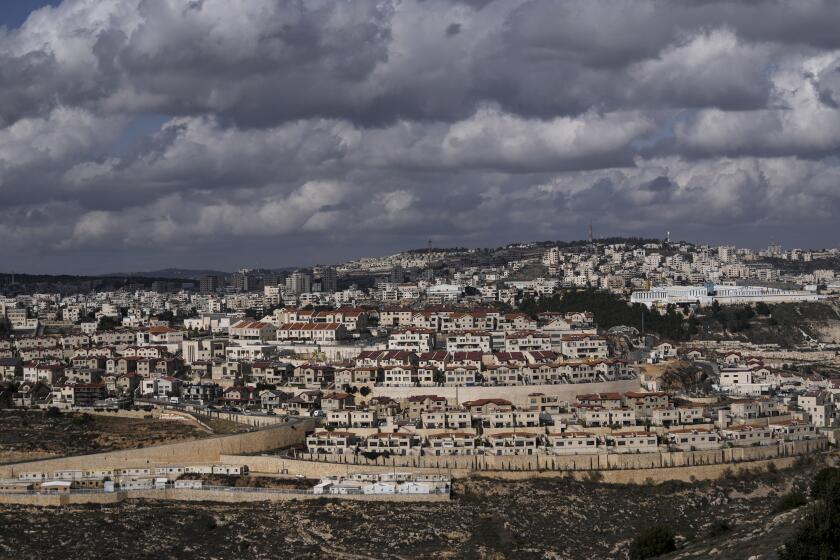Israeli airstrikes and Palestinian rocket fire continue despite cease-fire hopes
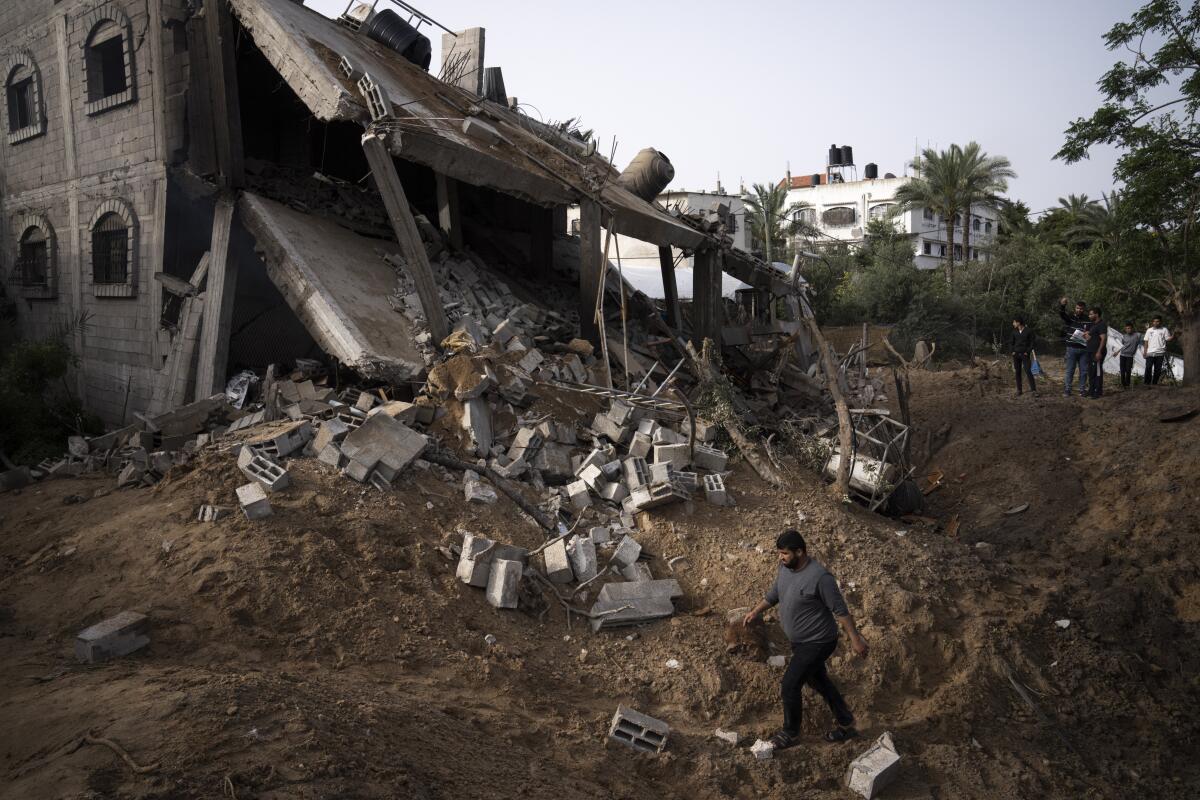
GAZA CITY — Palestinian militants fired rockets toward Jerusalem on Friday, further escalating the most violent confrontation in months between Israel and militants in the Gaza Strip despite international efforts to broker a cease-fire.
The burst of rocket fire from Gaza sent warning sirens wailing as far north as the contested capital of Jerusalem — about 50 miles from the Gaza border — breaking a 12-hour lull that had raised hopes that regional powers could soon broker a truce.
There were no immediate reports of casualties on either side Friday. The fighting between Israel and Islamic Jihad — the second-largest militant group in Gaza after the territory’s Hamas rulers — began Tuesday and has killed 31 Palestinians in the Gaza Strip, including women and children, and a 70-year-old man in central Israel.
A rocket slammed into an open field in the Israeli settlement of Bat Ayin in south Jerusalem, said Josh Hasten, a spokesperson for the area. Dull thuds could be heard inside the city, home to major sites holy to Christianity, Judaism and Islam.
Videos showed Israelis jumping out of their cars and crouching beneath highway rails as the sirens sounded. Residents in nearby Israeli settlements reported explosions and black smoke rising from the hills after an apparent missile interception.
“The bombing of Jerusalem sends a message,” Islamic Jihad said in a statement. “What is happening in Jerusalem is not separate from Gaza.”
A violent confrontation between Israel and Palestinian militants in Gaza has pitted the Israeli military against Islamic Jihad, a Gaza militant group.
In response, the Israeli military said its warplanes struck four Islamic Jihad military posts and a mortar shell launcher across the Gaza Strip. Residents reported that the strikes hit targets in open areas.
The office of Prime Minister Benjamin Netanyahu said he was conducting a security assessment to mount a further response. “We continue,” he tweeted.
The Israeli military urged residents living within 25 miles of the Gaza boundary to remain close to bomb shelters and to limit public gatherings until Saturday evening.
Sirens near Jerusalem took some residents back to spring 2021, when Hamas fired rockets toward the city, which helped set off a bloody 11-day Gaza war.
At that time, the militant group cited a provocative far-right march through the Palestinian neighborhoods of Jerusalem as one of the reasons for its rocket barrage, along with the displacement of Palestinians from the city’s east.
The U.S. is so far empty-handed in dealing with Israel’s radical government and dysfunctional Palestinian leadership.
Israeli police said they will allow the same Jewish ultranationalist parade — meant to celebrate Israel’s capture of East Jerusalem — to take place Thursday.
Since Tuesday, Israeli strikes have killed five senior Islamic Jihad figures and hit at least 215 targets in Gaza, including rocket and mortar launch sites and militants preparing to use them. Islamic Jihad has retaliated with nearly 900 rockets fired toward densely populated parts of Israel.
Israeli bombs and shells have destroyed 47 housing units and damaged 19 so badly that they are uninhabitable, leaving 165 Palestinians homeless, Gaza’s housing ministry reported. Nearly 300 homes sustained less serious damage.
Palestinians surveyed the wreckage wrought by Israeli strikes.
A rising number of Gazans driven by the mere prospect of work in Europe are drowning at sea, as leaders stay in upscale hotels elsewhere in the Mideast
“The dream that we built for our children, for our sons, has ended,” said Belal Bashir, a Palestinian living in Deir al Balah in central Gaza, whose family home was reduced to rubble in an airstrike late Thursday. He and his family would have been killed in the thundering explosion if they hadn’t run outside when they heard shouting, he said.
“We were shocked that our house was targeted,” he added as he pulled his young children’s dolls and blankets from a bomb crater.
At least 31 Palestinians in the Gaza Strip have been killed in the fighting, including seven children and four women, according to the United Nations humanitarian office. At least three of the children were killed by misfired Palestinian rockets, according to the Israeli military and the Palestinian Center for Human Rights.
More than 90 Palestinians have been wounded, the Palestinian Health Ministry reported.
The number of Jewish settlers in the occupied West Bank now exceeds 500,000, with advocates predicting faster growth under Israel’s new government.
The civilian deaths have drawn condemnation from the Arab world and concern from the United States and Europe. In its last four wars against Hamas, Israel has repeatedly faced accusations of war crimes because of the high civilian death tolls and its use of heavy weapons against the crowded enclave. Israel, in turn, contends that Palestinian militant groups use civilians as human shields by fighting in their midst.
Hamas, the de facto civilian government with an army of some 30,000 fighters in Gaza, has sought to maintain its truce with Israel while attempting to keep abysmal living conditions in the blockaded enclave from spiraling since the devastating 2021 war that killed more than 260 Palestinians. The group, which seized control of Gaza in 2007, has sat out this round of fighting — as it did a similar burst of violence last summer. In a sign of restraint, Israel has limited its airstrikes to Islamic Jihad targets.
Both sides had seemed on the brink of a cease-fire earlier this week. Hamas officials told local media Friday that Egypt was ramping up its diplomatic efforts to stop the fighting. But Israeli public broadcaster Kan reported that Israeli officials had pulled out of the talks in Egypt after Islamic Jihad unleashed rockets toward Jerusalem. Netanyahu’s office declined to comment on the reports.
Islamic Jihad figures have sent mixed signals about the cease-fire talks. Senior Islamic Jihad leader Ihasan Attaya complained early Friday that the mediators “have been unable to provide us with any guarantees.” A sticking point has been Islamic Jihad’s demands that Israel cease its policy of targeted killings, Attaya said.
Breaking News
Get breaking news, investigations, analysis and more signature journalism from the Los Angeles Times in your inbox.
You may occasionally receive promotional content from the Los Angeles Times.
Islamic Jihad political bureau member Mohamad Hindi sounded more optimistic. From Cairo, where he traveled Thursday to hash out the details of a possible truce, he told reporters that he hoped both sides “would reach a cease-fire agreement and honor it today.”
This week’s battles began when Israel launched airstrikes Tuesday that killed three Islamic Jihad commanders along with some of their wives and children as they slept in their homes. Israel said it was retaliating for a barrage of rocket fire launched last week by Islamic Jihad following the death of one of its West Bank members, Khader Adnan, from a hunger strike while in Israeli custody.
This week’s airstrikes and rockets have shifted the focus of conflict back to Gaza after months of surging violence in the occupied West Bank under Israel’s most right-wing government in history.
Israel has been carrying out near-nightly arrest raids in the West Bank that have killed 109 Palestinians so far this year — the highest such death toll in two decades.
At least half of the dead are affiliated with militant groups, according to a tally by the Associated Press. At least 20 people have been killed in Palestinian attacks targeting Israelis during that time.
More to Read
Sign up for Essential California
The most important California stories and recommendations in your inbox every morning.
You may occasionally receive promotional content from the Los Angeles Times.
